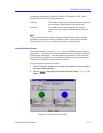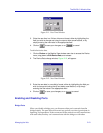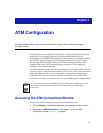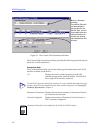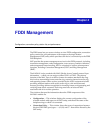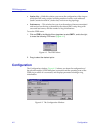
Accessing the ATM Connections Window 3-3
ATM Configuration
Settings
The Settings portion of the window contains a list box which displays information
about each of the currently configured PVCs, as well as the fields used to
configure new connections:
I/F The device interface on which the PVC was configured.
VPI Displays the Virtual Path Identifier assigned to the
connection; current versions of 9A128-01firmware allow
values from 0 - 3. Virtual Path Identifiers are used to
group virtual connections, allowing for channel trunking
between ATM switches. Each VPI can be configured to
carry many different channels (designated by VCIs)
between two points.
VCI Displays the Virtual Channel Identifier assigned to the
connection; allowable values are 0 - 1023 for each VPI.
Each assigned VCI must be unique within its defined
VPI: for example, you can assign a VCI of 14 as many as
four times: once with a VPI of 0, once with a VPI of 1, and
so on. Remember, it is the combined VPI and VCI
designations assigned to a channel that creates the
grouping of virtual connections.
Encapsulation Type Displays the method used to encapsulate LAN packets
on the selected circuit. Current versions of 9A128-01
firmware use 802.3 VC-based multiplexing for bridging
protocols (designated VC MUX 802.3 Bridged); future
versions will add support for ATM Forum LAN
Emulation and Cabletron’s SecureFast Switching. You
may also see some connections assigned a type of
“other”; these are default connections that cannot be
modified or deleted.
Status Displays the current administrative status of the
connection: enabled or disabled. In current versions of
firmware, all connections are enabled by default, and
cannot be disabled.
UpTime The length of time the selected connection has been
enabled.
NOTE
You can only view current connections; you will not be allowed to add new connections,
delete existing connections, or modify existing connections, on 9A128-01’s with the
firmware currently supported.



